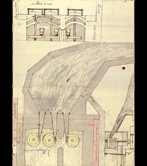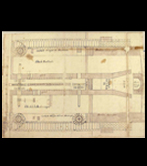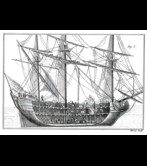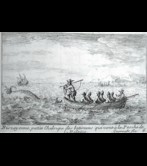Crisis in the traditional economy
Crisis in the iron industry
The crisis, which was difficult to overcome because of external factors, spread to other sectors. The Basque foundries could not compete with Swedish competitors (the first to have blast furnaces and to use coal). Among internal factors, the limited amount of iron in Bizkaia and deforestation and the consequent rise in the cost of charcoal, were both important. Furthermore, the foundries were rented, rather than owned, which further reduced their profit margins but not their costs. On the other hand, jobs that were complementary to farming, such as making charcoal, haulage and mining, were no longer incentives, given the greater profits to be made from agriculture.
Decline in trade and fishing
The fall in production within a declining political system - the Spanish monarchy - obviously affected trade. And at a local level, Bilbao displaced Donostia as the commercial port, although until 1682 it did not have its own consulate.
Whale hunting also declined in importance after the disaster of the so-called Invincible Armada in which many ships acquisitioned for the war sank at precisely the moment when control of sea and land in North America was passing from France to England. The Basques disappeared from the waters of the New World after the Treaty of Utrecht in 1713, although fishing was not big business at the time.
Resurgence of privateering
The fall in trade and the lack of resources turned the province of Gipuzkoa into the centre of piracy par excellence. Piracy became so important that in 1621 it was regulated, so that the Crown could take some of the profits.
To learn more about this subject "Corsairs and pirats" (Bertan Collection).
Monopolisitc trade
Another solution was the establishment of the San Sebastián Consulate, whose main contribution was the support, management and development of the Real Compañía Guipuzcoana de Caracas in 1728, with the Crown’s participation. It also protected the coast of Venezuela as the company’s ships were armed. Set up as a public limited company, it revolutionized the economy of the province, stimulated imports (cocoa and other colonial products) and exports, mainly iron, as well as boosting shipbuilding (with all its associated trades) to maintain its considerable fleet. The company’s profitability meant that the Gipuzkoan bourgeoisie accumulated a great deal of capital. However, it gradually declined. In 1795 it was refounded as the Compañía de Filipinas (Philippines Company) but with little success.
Development in shipbuilding
The Compañía de Caracas’ ships evolved along with 18th century shipping and shipbuilding, producing longer and technically more developed boats, principally made by the shipyard Gaztañeta. As they succeeded in bringing home more booty than their adversaries, they were copied in London and Holland.

%20OK%20p.jpg)





